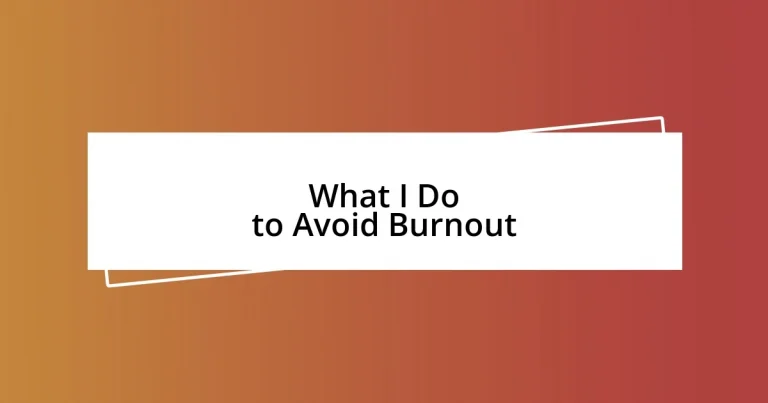Key takeaways:
- Recognizing burnout involves identifying emotional exhaustion, loss of enthusiasm for work, and physical symptoms like chronic headaches.
- Establishing clear work boundaries, practicing effective time management, and prioritizing self-care routines are crucial strategies to prevent burnout.
- Engaging in a supportive community and regularly evaluating commitments can provide essential relief and realignment to avoid feelings of overwhelm.
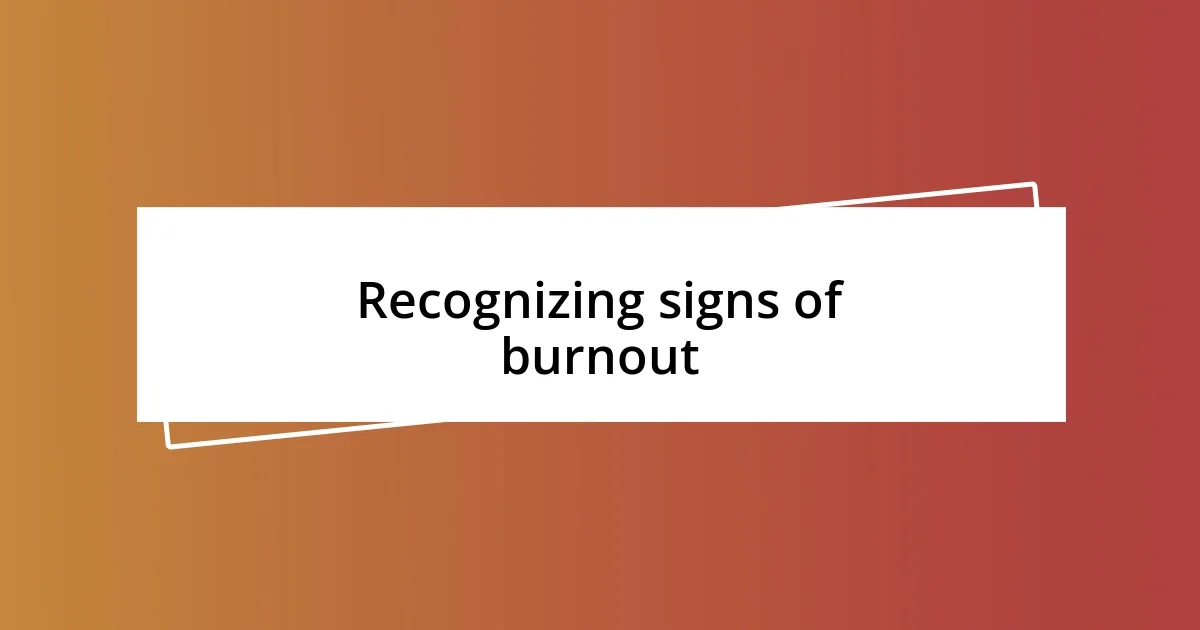
Recognizing signs of burnout
Recognizing the signs of burnout can sometimes feel like trying to spot a shadow in the dark. I remember when I first became aware of my own symptoms: increased irritability and a sense of emotional exhaustion crept in so subtly that I often ignored them. Have you ever felt that moment when simply getting out of bed feels like a monumental task? That’s a classic signal.
Another telltale sign I’ve experienced is the loss of enthusiasm for work that I once found fulfilling. It’s strange how something that used to excite me now feels draining. I began to question whether I was working towards my goals or just going through the motions. Reflecting on your feelings about your daily tasks can reveal a lot—ask yourself, do they still spark joy or merely obligation?
Physical symptoms can be just as revealing. I recall a period when I started to experience chronic headaches and sleepless nights, which initially seemed unrelated to my work. It was only after reflecting on my stress levels that I understood the connection. Have you noticed any physical changes in your body that could be linked to your mental state? Recognizing these physical manifestations can often be the first step towards addressing burnout.
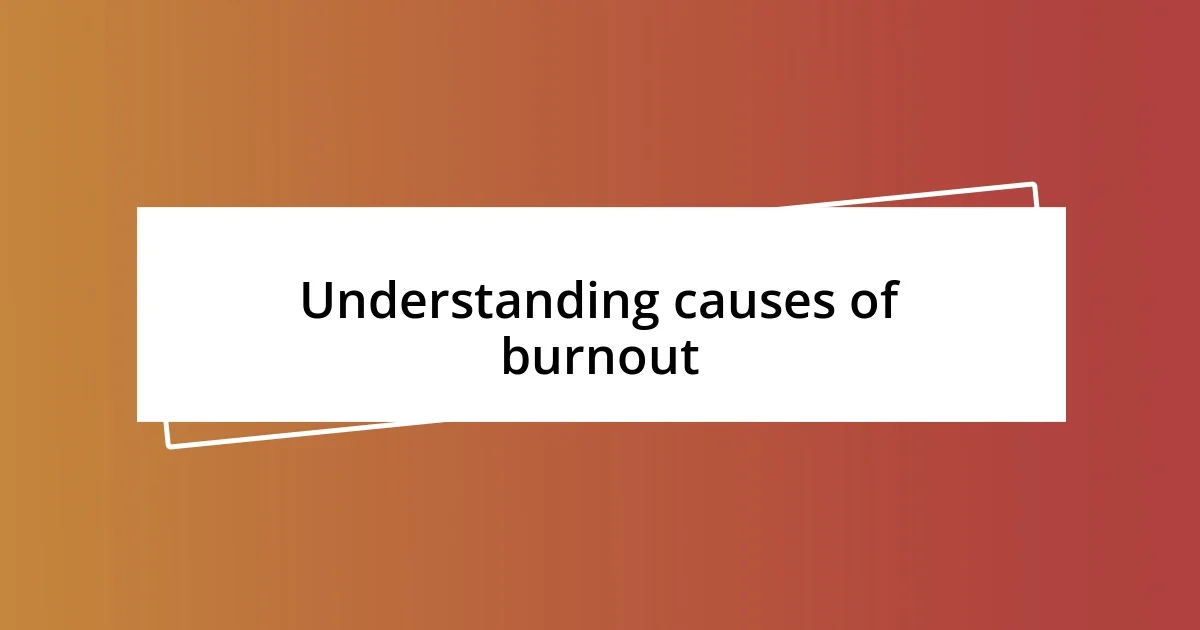
Understanding causes of burnout
Understanding the causes of burnout goes beyond simply identifying symptoms; it involves delving into the sources of our stress. In my own experience, I found that work overload was a significant contributor. The failure to set boundaries allowed my workload to spiral out of control, making it feel as if I was perpetually racing against time. Have you ever felt like you were juggling too many balls in the air, all at once? It’s a precarious position to be in.
Another major factor I’ve noticed is the lack of support. There was a time when I felt isolated in my role, and it wreaked havoc on my motivation. Trust me, having someone to share the load with or even just a sounding board can make all the difference. It’s fascinating how connection can mitigate feelings of overwhelm, isn’t it?
Lastly, I’ve learned that a misalignment of values can foster a sense of burnout that’s difficult to shake. When the work I was doing didn’t resonate with my personal beliefs, it left me feeling unfulfilled. I often pondered, “Is this what I truly want?” This inner conflict drained my energy and enthusiasm. It’s crucial to reflect on whether your daily tasks align with your core values, as this can either fuel you or leave you feeling depleted.
| Cause of Burnout | Description |
|---|---|
| Work Overload | Taking on more tasks than one can handle can lead to chronic stress and fatigue. |
| Lack of Support | Feeling isolated at work without encouragement or assistance can exacerbate feelings of disengagement. |
| Misalignment of Values | Working in a position that contradicts personal beliefs can create internal conflict and dissatisfaction. |
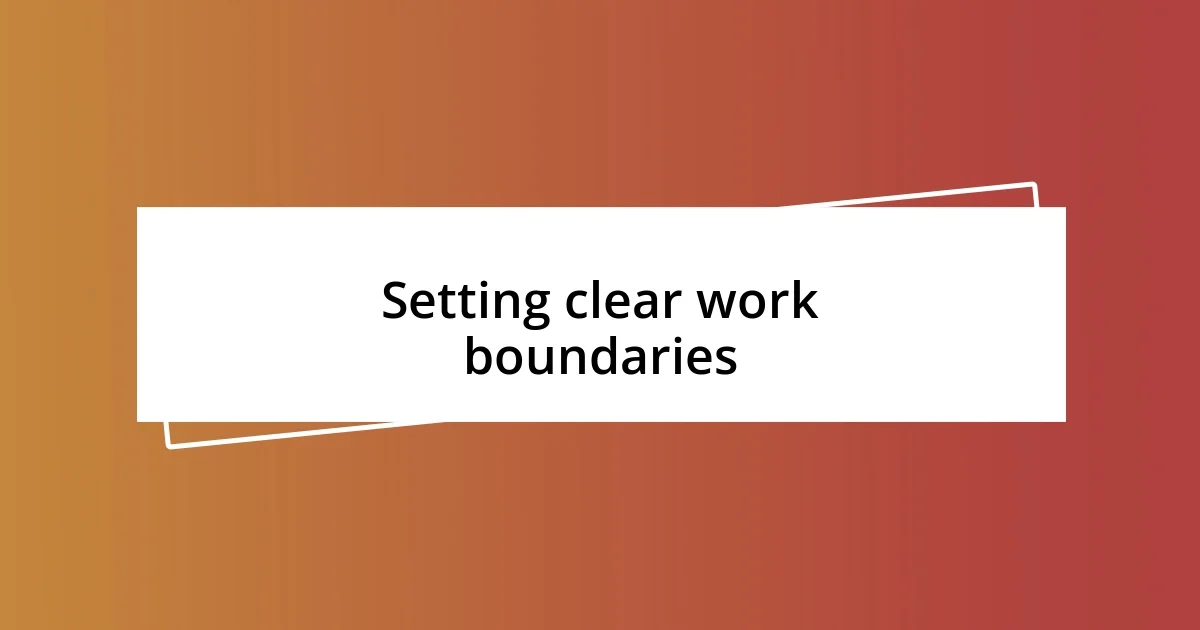
Setting clear work boundaries
Setting clear work boundaries is a fundamental step in preventing burnout. I learned this the hard way—a few years back, I allowed work to seep into my personal life so much that answering emails late at night became my norm. I remember lying in bed, laptop open, feeling a mix of obligation and exhaustion. It took a serious conversation with myself to realize that constantly being “on” wasn’t sustainable. Establishing clear boundaries means knowing when to say no and giving myself permission to switch off without guilt.
Here are some strategies that I’ve found really help in setting those boundaries effectively:
- Define your work hours: Be explicit about when you’re available and when you’re not.
- Communicate with your team: Let them know your boundaries so they can respect them.
- Create a designated workspace: Having a specific spot for work helps to mentally separate it from home life.
- Use technology wisely: Consider using tools to manage notifications that interrupt your personal time.
- Practice saying no: It’s okay to decline additional responsibilities when your plate is full.
By embracing these practices, I feel more in control of my time and energy, limiting the chances of burnout creeping in.
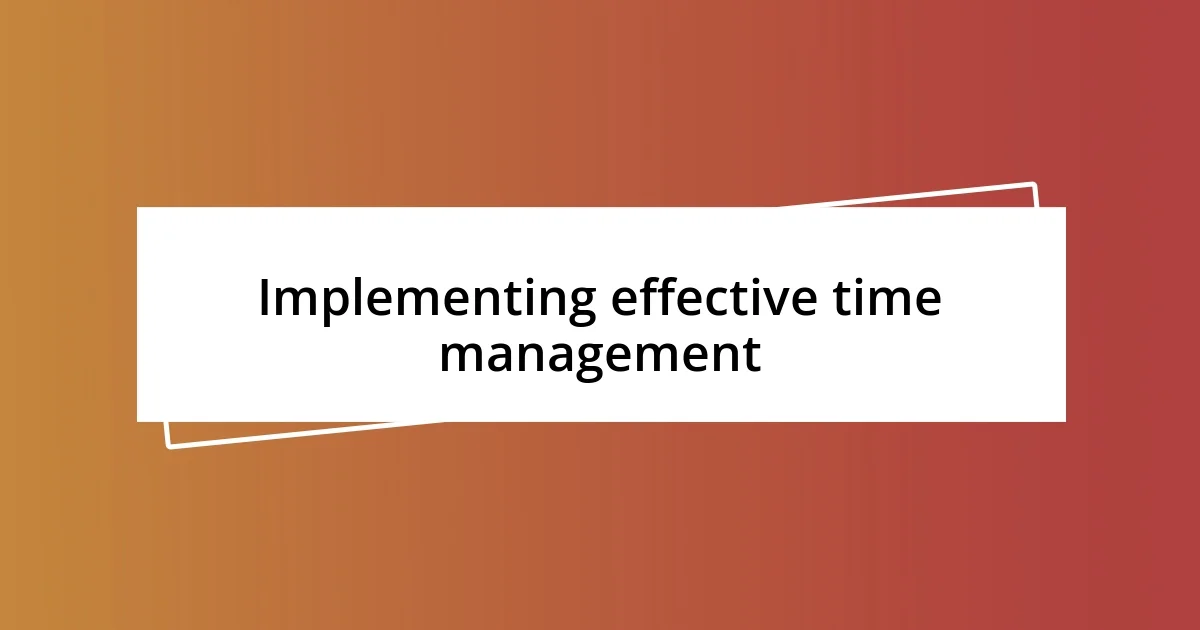
Implementing effective time management
Implementing effective time management is a game-changer in my battle against burnout. One approach that has served me well is the habit of prioritizing tasks. I often sit down at the beginning of the week and create a list that categorizes my responsibilities—urgent, important, and non-essential. This simple act of organization transforms what once felt like chaos into a more manageable flow. Have you ever tried taking a step back to look at what’s truly important? It can provide much-needed clarity.
Another technique I rely on is blocking out my calendar for deep work sessions. I remember a particular day when I turned off all distractions for two hours and focused on a single project. The shift in my productivity was palpable. Those two hours felt like a mini-retreat, allowing me to refocus and recharge my mental energy. When was the last time you dedicated uninterrupted time to something that truly matters? The difference it makes is often astounding.
Lastly, I’ve found that incorporating breaks into my schedule is essential. Initially, I resisted the idea—sneaking in a quick break felt like losing precious time. However, I eventually learned that stepping away, even for five minutes, allows my mind to refresh and enhances my overall efficiency. During those breaks, I often take a moment to breathe deeply or go for a quick walk, and I can’t stress enough how much that small act nourishes my creativity. Are you giving yourself the breaks you deserve? It’s a small adjustment that can lead to significant benefits.
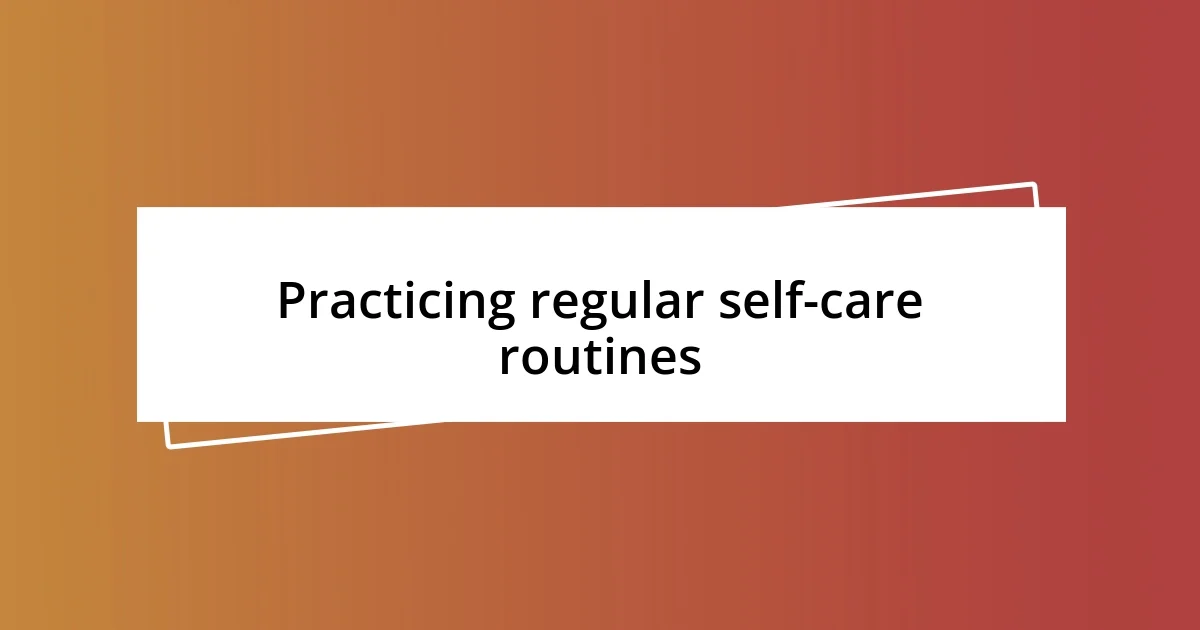
Practicing regular self-care routines
Practicing regular self-care routines has been crucial in my fight against burnout. There was a time when I thought self-care was a luxury, something to be squeezed in only when I had spare time. However, after feeling drained for several weeks, I decided to make self-care a non-negotiable part of my life. Now, I set aside time each day to engage in activities that nourish my spirit, whether that’s journaling, reading, or simply enjoying a warm cup of tea without distractions. This intentionality not only recharges my batteries but also cultivates a sense of balance. Have you carved out moments in your day just for yourself?
Another aspect I cherish is the weekly ritual of unplugging from technology. I remember one Sunday morning, I turned off my phone, leaving it in another room while I indulged in a long walk. The absence of notifications created an unexpected sense of freedom. I candidly enjoyed the sound of the rustling leaves and the fresh air filling my lungs; it offered clarity and rejuvenated my mind. How often do we give ourselves the chance to disconnect from the digital noise to reconnect with ourselves?
I also believe in the power of mindfulness and meditation as part of my routine. Initially, I was skeptical about sitting in silence, convinced I would find it hard to quiet my racing thoughts. Yet, I pushed through the discomfort and was surprised to discover a profound sense of calm. Just the act of focusing on my breath for a few moments each day has made a world of difference. It’s a gentle reminder to be present, and I often find myself returning to this practice when life gets hectic. What practices have you explored to keep your mind centered amidst the chaos?
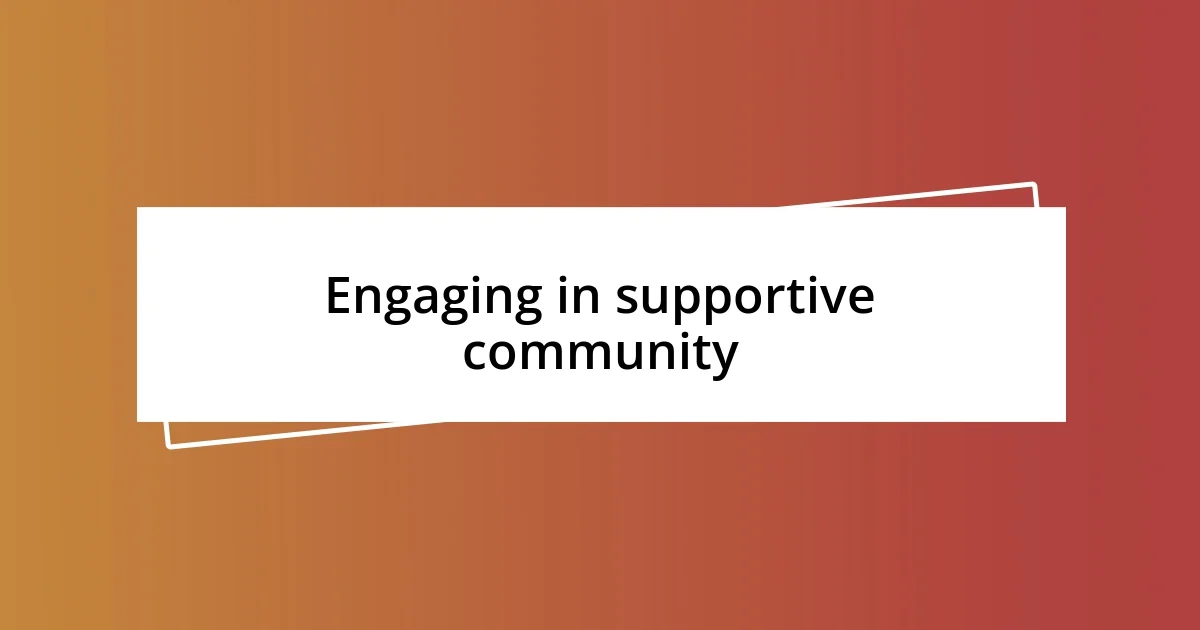
Engaging in supportive community
Engaging in a supportive community has become a cornerstone of how I prevent burnout in my daily life. There was a time when I thought I had to go it alone, pushing through challenges with a “tough it out” mentality. It wasn’t until I joined a local group focused on wellness that everything changed for me. Sharing my experiences with others who understood the pressures I faced created a sense of belonging that was both comforting and invigorating. Have you ever considered how powerful it is to be surrounded by like-minded individuals who lift you up?
I vividly remember the first meeting I attended—it felt a bit intimidating at first. However, as I opened up about my struggles, I found others doing the same. Their acceptance and empathy made me realize that vulnerability can be a strength. We exchanged stories, laughter, and helpful tips on managing stress, and I left feeling energized and supported, as though I had just taken a breath of fresh air. Does your environment foster that kind of open, uplifting communication? It’s astonishing how these connections can lead to breakthroughs in personal growth.
Additionally, I make it a point to engage with my community online, too. Participating in supportive forums has enriched my perspective tremendously. Just last week, I shared a concern about balancing work and personal time, and I was met with an outpouring of advice and encouragement. Those interactions reassured me that I’m not alone in my journey. How crucial is it to have a network that understands your struggles? My experience tells me it’s fundamental, offering a lifeline during tough times and reminding me that we’re all in this together.
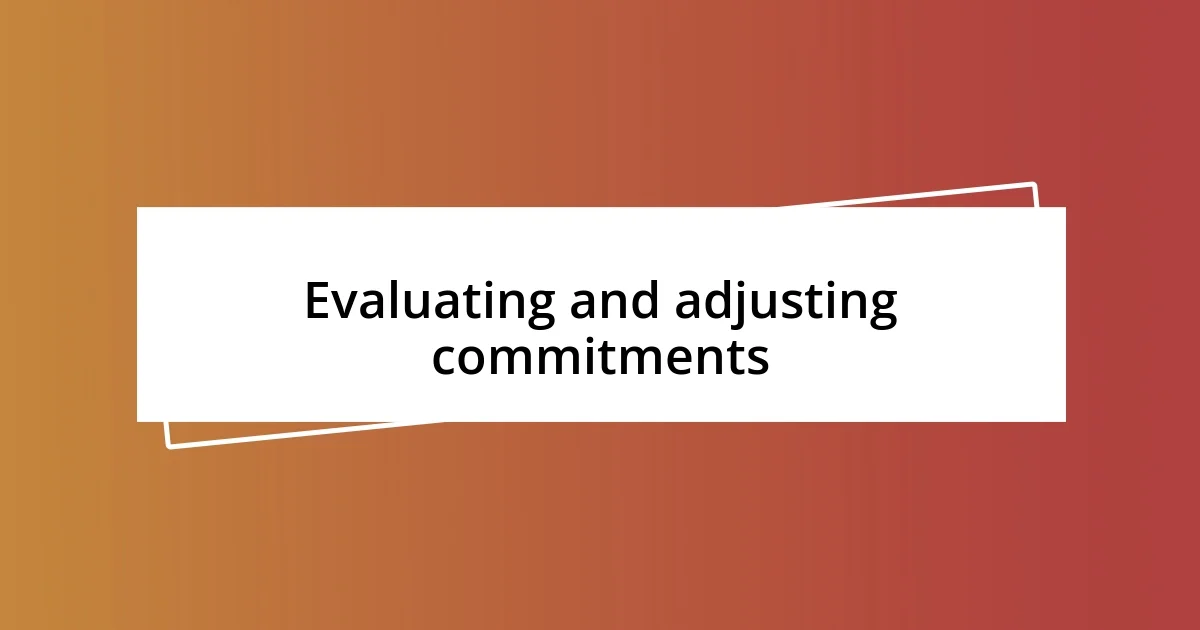
Evaluating and adjusting commitments
Understanding my commitments has been a game-changer in my approach to avoiding burnout. I remember a time when I felt overwhelmed by a packed calendar. I decided to sit down and evaluate every obligation in my life. I asked myself, “Which of these commitments truly fulfill me, and which ones drain my energy?” This reflection allowed me to reprioritize and say no to what wasn’t enriching my life.
Adapting my commitments based on this ongoing evaluation has brought a refreshing sense of clarity. For instance, I once co-hosted a community event that, initially, seemed exciting. However, as it approached, I realized it was becoming a source of stress rather than joy. By recognizing this, I bravely stepped back and delegated my role. That single adjustment not only lightened my load but also reminded me that it’s okay to reassess and realign my obligations with my current state of well-being. Have you ever felt the relief that comes from letting go of a commitment that no longer serves you?
I’ve also adopted a practice of regular check-ins with myself to ensure my commitments align with my values and energy levels. After a busy week, I often reflect on what felt rewarding and what felt like a chore. This simple practice has helped me maintain balance and avoid that dreaded burnout. When was the last time you took a moment to evaluate your own commitments? It’s sometimes in those small moments of introspection that we find the greatest insights into our needs and limits.











